Interview by Kaylee Duval
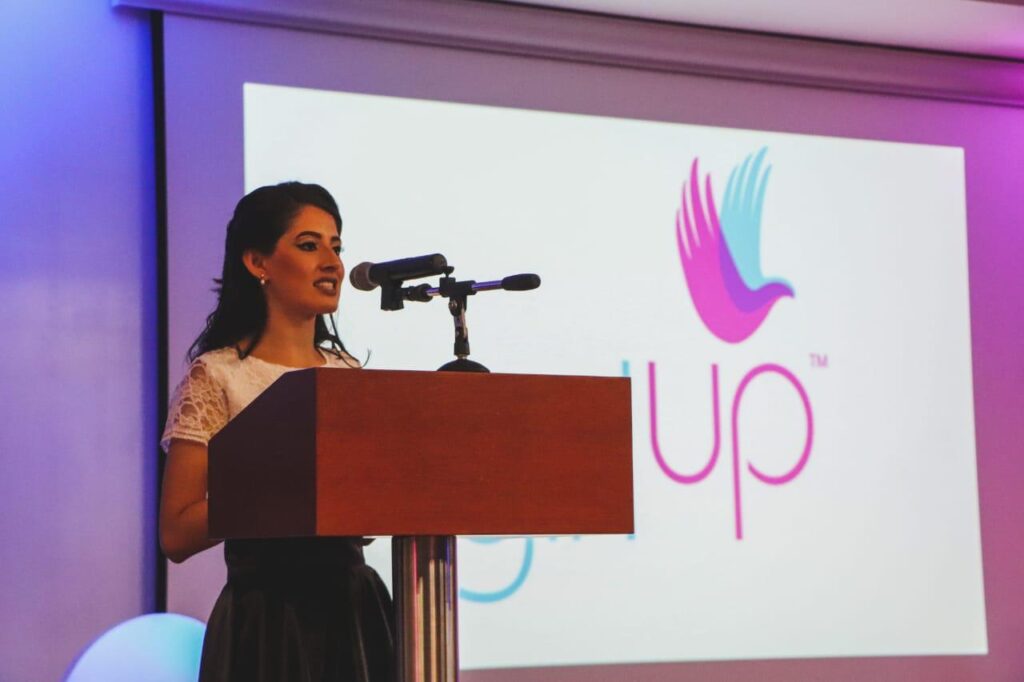
You are the co-founder of the organization VotoVoz, an organization that focuses on educating, encouraging, and empowering the youth of Latin America to increase civic participation and awareness. Were there any specific moments that inspired you to begin this organization and encourage the youth to participate in politics?
Of course! In VotoVoz, we focus a lot on citizen participation. This whole idea began last year because, in Mexico, they were celebrating the midterm elections of the country, in which thousands of public offices were elected. It surprised me that, at first, I had no idea who my local leader was. I knew no one. At eighteen years old I asked, “I’m already going to vote…Who will I vote for?” Other people also had no idea who they were voting for. No one had an idea about anything.
What really grabbed my attention is that with all these issues, like climate change, so much occurs around us and sometimes we don’t even realize it. This is part of civic engagement: caring for our city, our state, our country, our planet and involving ourselves in what is happening already outside of the decisions that public figures are making about issues that affect us directly as global citizens.
More or less the idea for VotoVoz began here, and, at the beginning of this year the project formed. Fortunately, we have had seven successful months with this organization!
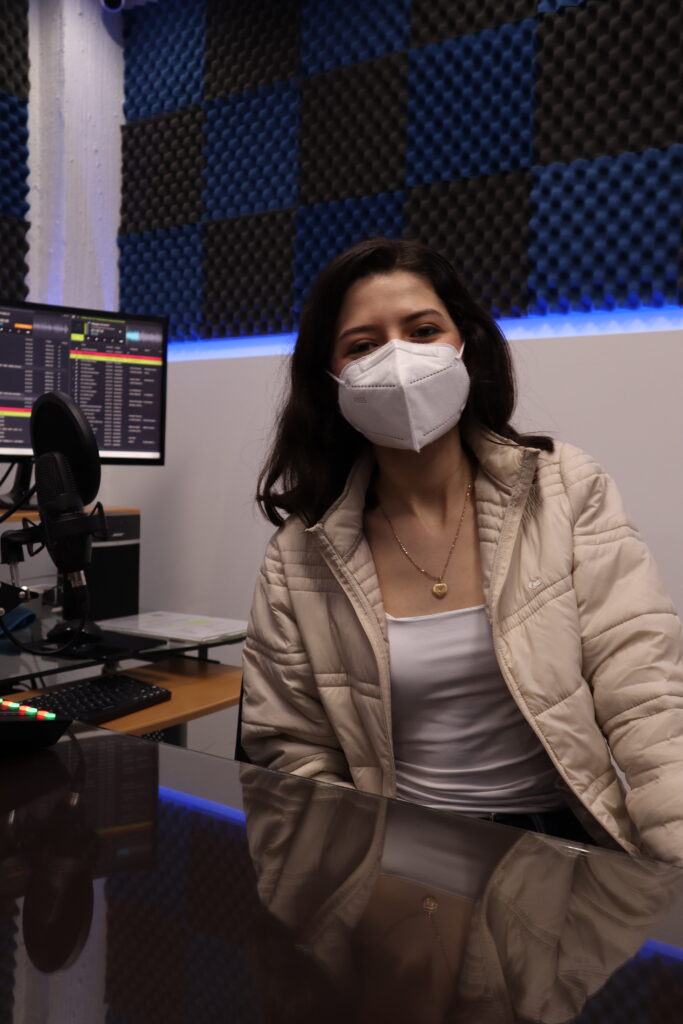
Has your community influenced the establishment of the organization?
Yes, definitely. There are a million people in Toluca. It struck me that out here, people always claim to be involved in politics and in what happens around them, but don’t even support local consumption. The people prefer an American establishment over buying some tacos in the street that families are breaking their backs to make in order to give their families something to eat. Even on my weekend trip to the market to buy produce, I saw this all around me. I saw that people bought from the supermarket to find delicious, healthy foods to eat, when there were the exact same things being sold in the streets, where purchasing would also support local consumption and decrease exploitation of resources. Many of these small lifestyle choices exist within civic engagement, and it’s time that we begin to grow together. We are always competitive, focusing on making bigger businesses, when the point should be supporting each other and growing together as a community, as a city, as a society. Not individually. This was something that influenced me.

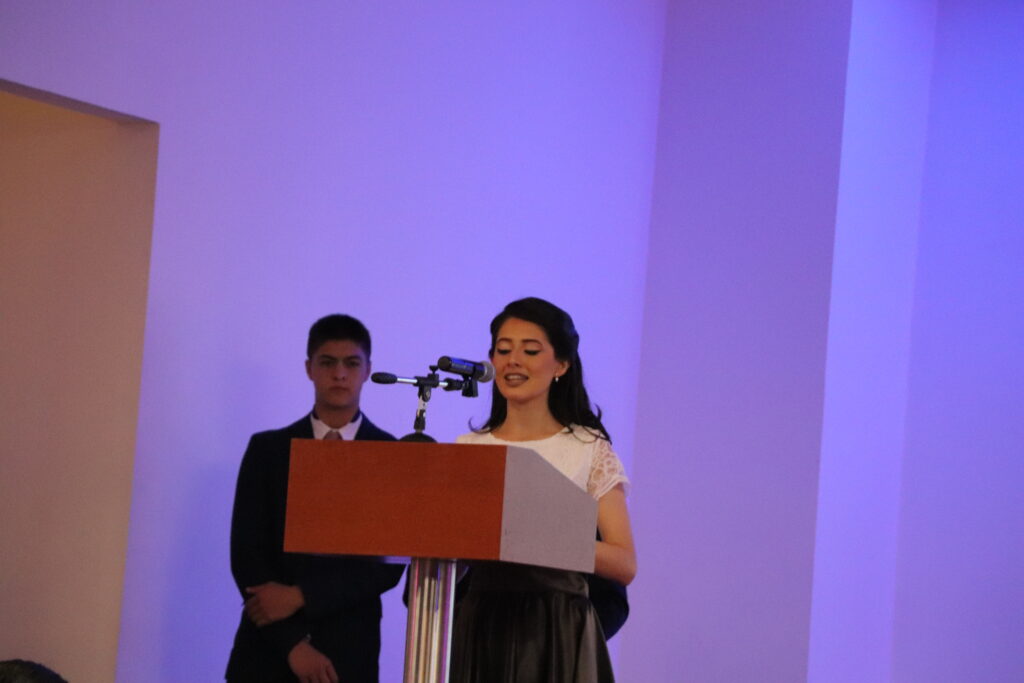
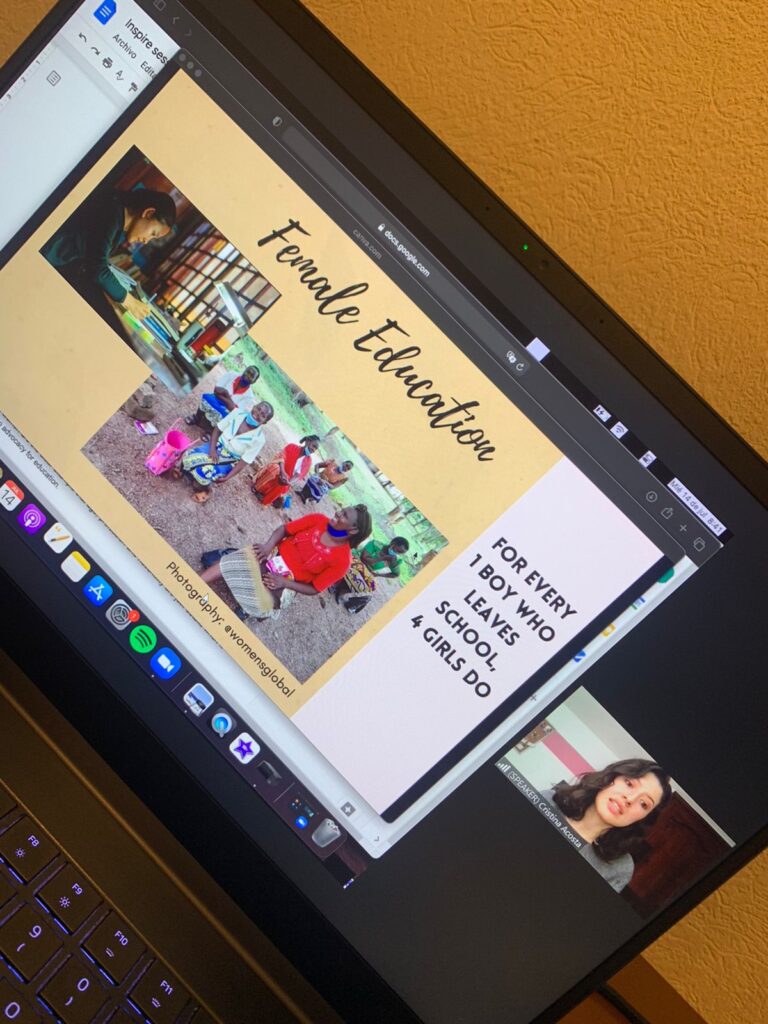
You have given multiple speeches regarding the importance of women’s education. How were these experiences? Do you think that doing more speeches can create a greater impact?
Of course. I believe that for the people that attended the conference, it was the first step to grow seeds of change. When you give these speeches, you might not change the ideas that other people think or decide to act on, but at the least you make them question what they are doing or what they need to do. Fortunately, I had the opportunity to be in the Leadership Summit this year in a GirlUp session about women’s education and the difficulties that women face. Evidently, I was part of Latin America in the conference and based a lot of what I said on what we live through in Latin America: the women, the menstrual poverty, not having access to health services, etc. I want to make use of all this information that I’ve gained through my education to help women say, “I’m going to go to school despite of the 20 kilometers I have to walk and pass through it all, gender violence, harassment, all types of things that prevent women from having something as simple as a preschool class, a primary school class, a middle school class.”
It was this process of reflecting on what needs to be supported in the agendas in public transformation — what is lacking in organizations that promote the reinforcement of governments. This was my experience. I believe that it’s part of why I am studying public transformation, to see what is it that we need to do and how we are going to do it? Because you always don’t know if there aren’t resources, aren’t something, etc. and I feel like it’s that we don’t have resources. There are so many actions that can be taken on your own with an idea and what you said, too. They put great emphasis on the fact that I often have the opportunity to talk about women that inspire me. Women of all types. Local activists, women that are doing whatever thing, because I believe that when we speak of women that inspire us, we talk about how they achieved these things. It’s an example to follow, don’t stay and say “Oh, they did it, how good for them!” What can I do similarly in my community, my country, my school? We don’t go much further.
You are also vice president of Ambar. With this organization, you do a lot of work to empower women through social media and events, amongst other efforts. Through empowerment, do you think you have impacted women and that social media have played a significant role in this process?
Definitely, I believe that social media has come to revolutionize the way that activism functions. Online presence, Zoom classes and meetings, social media–I think that all these digital tools can be a limiting factor for people who might not have many resources that they put towards the internet and technology. However, digital media continues to be a benefit for impacting people at all angles, as isolating yourself from digital media limits your reach. With digital media, you can impact the cities nearby. You can do many of these things.
Particularly in Ambar, we focus on empowerment and promoting self-esteem as the first. Before changing your surroundings, support change within yourself, if you are okay with yourself, and if you are sure of what you are doing. You have to feel happy with what you are doing, no? Being in the middle of violence is not what is going to make you happy. How to leave these situations — that “how” — is what we speak about in Ambar, and definitely social media has been our best ally this past year.
Now in Toluca, we are expanding within the city of Mexico and further throughout Mexico, and we have had much progress. I would like to say, “Yes, we’ve impacted twenty women,” but I think that I wouldn’t know how to tell you if we have even impacted a single person. Later, I think how you commented that every event, every conference, every workshop that we do is something that is impacting others. In fact, now we are developing a manual about social responsibility, about empowerment that will be universally accessible. We are going to hand it out once we make it, obviously, and I want a woman of thirty years to find this manual and say “Hey, I think what my boyfriend does is not okay. I think I shouldn’t let my parents prevent me from studying.” I think this is the change and I hope to achieve this above all. I believe that in recent months, our advocacy we have made about little girls, I hope we have begun cultivating a seed of saying “I want something more. I want to study, I want to work, I want etc.”
As women, many of them in Latin America suffer from acts of violence against women, varying between humiliation, blame, and sexism to aggression, violation, and feminicides. Generally, it’s an urgent topic. How do you think we can confront this situation, and what would be the first steps to do so?
Well here, before anything else, things like femicides, violation, sexual violation–it all obviously stems from a sexist education system that is promoted everywhere: at home, in school. To create change, we first have to begin from there. I know that sometimes we say that in the home is where you are taught your principles; I completely agree, but I think that public education plays a very important role. From what I have seen in Mexico, never in my 18 years of education and reading textbooks, no matter what topic, never have we spoken about women’s rights; never have we spoken about sexual harassment, nothing about these topics.
Why don’t we talk about these ideas? We know that they are taboo topics, but if we don’t talk about them, we can’t resolve them. I think that that is the issue — that we aren’t talking about what we need to talk about. How much time will it take for this to occur here in Mexico, when they passed a law regarding dignified menstruation barely a few weeks ago, when it should already be an universal right for all women?
The issue is that we aren’t talking about it, and women in families, for example mothers and grandmothers who tend to educate the children, might not have preparation to confront certain issues because they didn’t receive this type of education. It’s a little difficult to change the previous generation, but for the one that is here now, the one that is in primary school, we need to ask: why are the books skewed? Why are there no heroines in history books? Why are we not talking about what women do or what is happening to women? Of how to raise complaints against violation, why are we not teaching them in school? I believe that talking about these experiences and these actions is very important because they are part of daily life in Mexico, where there are at least 11 femicides declared daily. Why don’t we talk about how to rise against femicides, against harassment, against violence towards women? I think that what we lack is discussion about what we need to resolve.
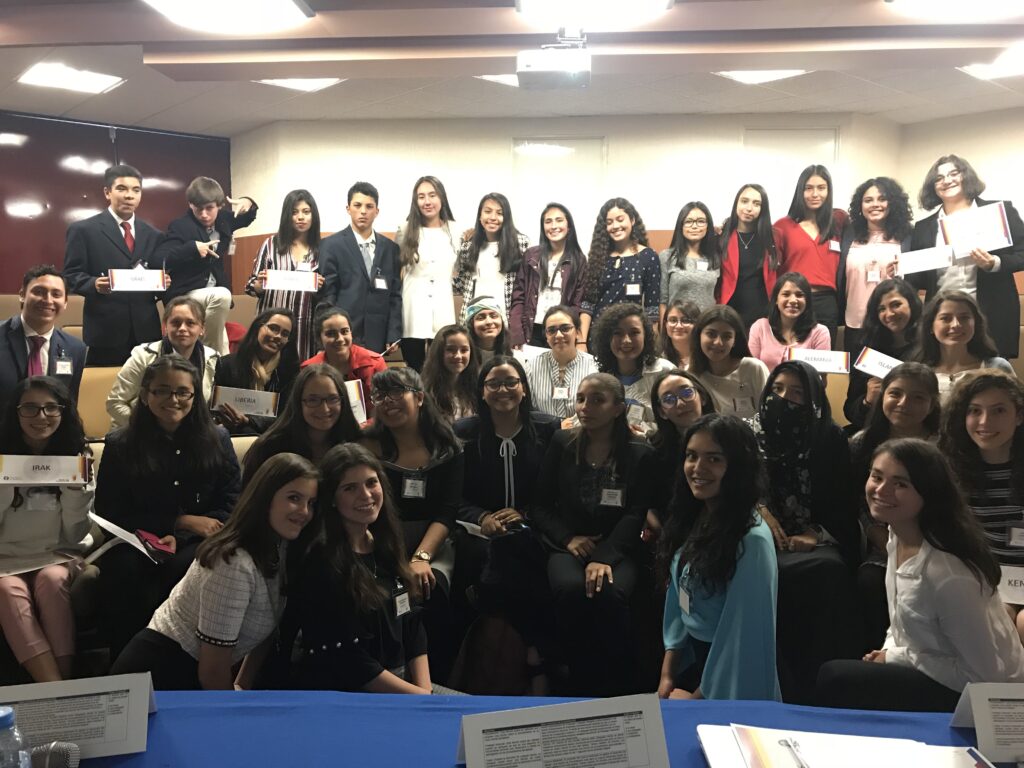
You participate in Model UN; Do you think that the creation of platforms so that youth can be involved civically and so that they discuss and resolve issues at local, national, and global levels is important? Why?
Of course. I enjoy the UN models because I believe that they provide this possibility of understanding complex problems that require complex solutions. Sometimes we don’t realize that, often, it’s much simpler to criticize and say, “Why is my park in such a terrible state? Why is public transport continuing to be terrible as a woman? Why do they have me do something with force?” I think that understanding these issues that sometimes appear to us as simple, aren’t really that way; they require effort, and planning to change them. I think that involving oneself in these models permits you to take in your surroundings to see what is happening in your country. It permits you to understand that certain issues not only occur in your country but also happen worldwide.
Sometimes, someone may say, “I am going to run from Latin America because that doesn’t happen anymore outside.” But no, these events and injustices happen. Also, you have to understand that from the outside as well. Many continue unaware, definitely, but this doesn’t change the fact that you have to understand the reality of the world outside your community and that you have to do something to change these situations.
Yes, it’s a global effort, but I believe that boundaries are something that limit us, that stops us. Why can’t we adopt the same thing that another country did that worked for them? Why can’t they intervene here if it’s something that will benefit us? Understanding that cooperation, working in a team and in a community, is what forwards us as a society is important.
If you continue living individualistically, not understanding the problems around you and ignoring the issues of your neighbours, you need to know that you aren’t helping the issues through your actions. It’s the opposite; you are harming others instead of supporting those around you.
How do you think that this can be an advantage for the youth in creating necessary change in the world?
As youth, we are impressionable. We hear something and it impacts us, whether it is good news or bad news. As youth, what we need is to be in touch with reality. Not that I’m saying that we don’t live in reality or that we don’t live the law, but I think that sometimes people have the possibility of making change but aren’t aware, assuming that things aren’t as bad as they seem, believing that you have to live your life and defend yourself from the rest around you, that everything is alright when it’s not. I think youth need to remove the blinds from their eyes and understand that yes, in previous generations they screwed things for us, climate change, etc. But the power to make changes lies in us.
A teen can do what they want, there’s no age, no race, no gender that can be a restriction, not that there should be ones, to make change. I think that youth are those who can also have this idea, unreal if you would like, but we aren’t in touch with reality because our parents protect us, that the law or life protects us etc. and make us think that things aren’t so bad. For this, I believe that we always bring this motivation of desiring to do things, that we aren’t so out of touch with reality and say “no, we can do something regarding the issue” and I think this is important, that the teens begin saying “You know that I can do something to change my block. My block. I can sweep, I can meet neighbours, we can reach agreements of who needs what.”
We are youth that can make this change wherever we are, and it begins within our communities.
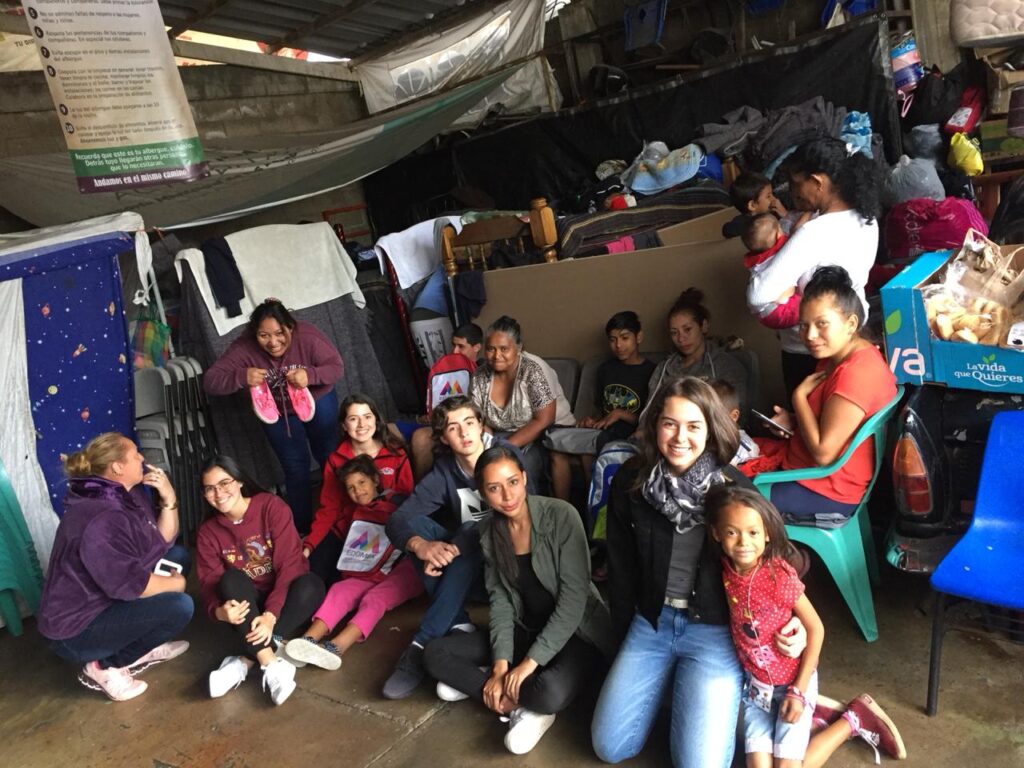
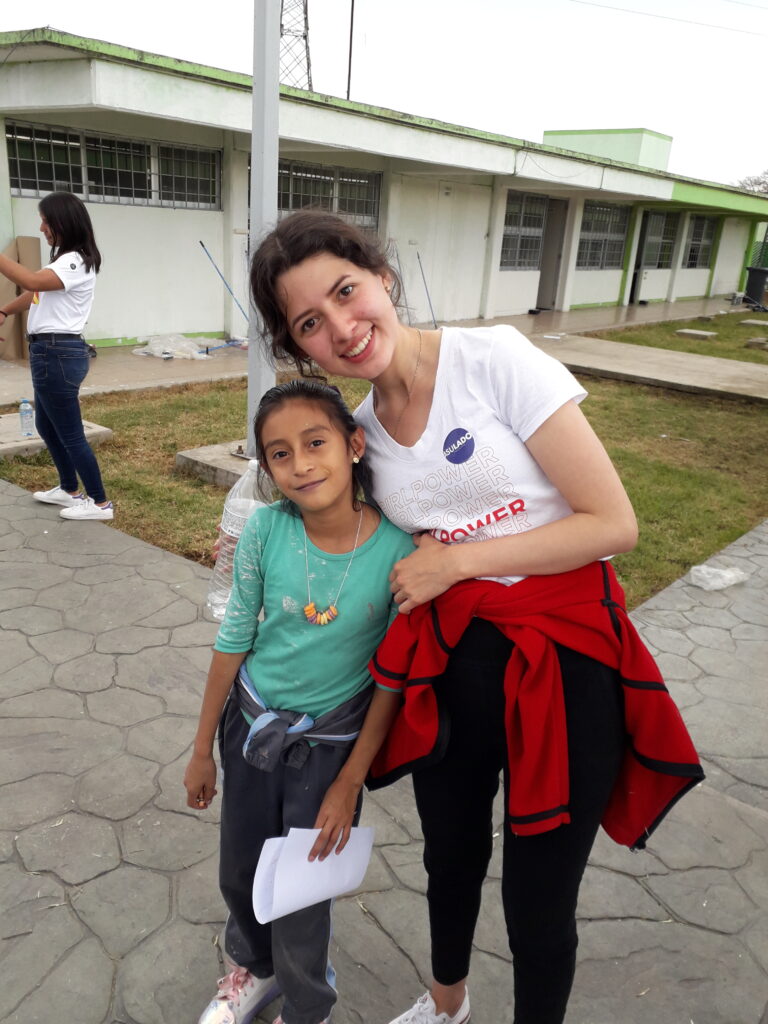
How has your community and background influenced the development of your passions of making a difference and participation in these organizations?
I live in Toluca, and here is one of the most dangerous places to be a woman in Mexico. You can’t leave to do anything without the risk that an incident may occur, no matter where in the area you are. Knowing this is what motivated me to say this: one can’t continue living like this. I can’t stay seated and watch another woman that leaves to the streets for bread never return home. That impacted me greatly.
Another part is migration, one of the topics that I am most passionate about in the universe. I truly believe that the term immigrant is so unreal; it’s that I don’t understand why we categorize, why we shun others for not having been born in our country. Here in Toluca, this is a passing city for the immigrants in Mexico because there’s a famous route that’s called ‘The Beast’ (La Bestia) that crosses from the point of Mexico of colonial Central America up to almost the north of the country. It passes through Toluca, through the center of the city as well. Having so many different people in the cities impacted me, influenced me and caused me to think “How is it possible that another person in this world cannot have access to public health services?” These moments also impacted me and my interest in public transformation greatly.
My grandmother has also been working in government for many years, and my family was always very involved. My mother even studies law.
I saw relatives and, not to throw dirt, always said, “Why are you not doing something more? You have the opportunity, so why are you not trying to build something better for yourself, for the people that you could impact?” They also came to me and said, “Why is it that those with the power to do something don’t do anything? How is it possible that they aren’t driving the establishment of initiatives?”
All this around me, in my family, in what I live here in the streets is what transformed this passion for activism in me.
Connect with Cristina!